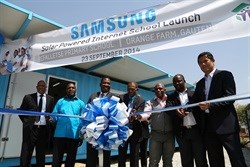
Top stories






More news














Speaking at the hand-over event, Gauteng MEC for Education, Panyaza Lesufi, underlined the role which ICT could play in advancing education. "The integration of ICT in our education system will undoubtedly raise the quality of education in our country. Teachers will have been empowered to engage in more research while preparing their lessons and the students will have a chance to gain more knowledge from online content."
The exclusively solar-powered, mobile and completely independent classroom is geared at increasing accessibility to education and connectivity across Africa. It is designed particularly for use in remote rural areas with limited or no access to electricity.
It is believed that on average less than 25% of rural areas on the continent benefit from electricity, resulting in isolated communities with limited access to education and connectivity - both of which are key to fast-tracking a nation's development. The initiative is an example of Samsung's investment in corporate citizenship on the continent: a keen focus on education and harnessing the company's legacy of innovation to respond to the felt needs of people on the continent.
"At Samsung, we are keen to support societies and their communities in many different ways and the SPIS will provide better knowledge transfer, learning and research opportunities both for learners and teachers alike, as well as equip them with the necessary employable skills for the future," says Ntutule Tshenye of Samsung Electronics Africa. "Education will change Africa. And access to technology will change education," he adds.
Each SPIS is built in a 12m long shipping container, making them easily transportable via truck to remote areas. The schools are built for energy scarce environments, harsh weather conditions, and for transportation over long distances. Fold-away solar panels provide enough energy to power the classroom's equipment 24/7 and can run for an entire week without additional sunshine. The solar panels themselves are made from rubber instead of glass to ensure they are hardy and durable enough to survive long journeys across the continent.
The classroom can comfortably accommodate 24 learners, and includes several layers of insulation and a ventilation system, to ensure a temperate environment is maintained. Each classroom is fitted with a 65-inch E-board and Samsung notebooks, all of which are optimised for use in a solar-powered environment.
"We are proud to partner with Samsung and the provincial Department of Education in assisting the community of Orange Farm by creating an environment that would facilitate learning for the whole community," says Adrienne Burke, marketing manager for Habitat for Humanity South Africa. "It is also important to highlight that the SPIS can be used as an adult education centre in the afternoons or a community centre over weekends," she adds.
The school is equipped with a router, a file server, an uninterrupted power supply (UPS) and video camera, all of which are designed to communicate via 3G or satellite connection. The server contains the complete South African school curriculum spanning from Gr 0 to Gr 12, allowing the school to teach any school going subject or grade.